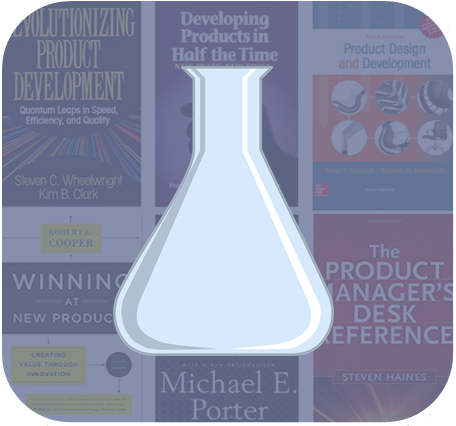Chapters
Chapter OneNote: This content is from the Product Development Distillery email series: a daily email that teaches essential product development skills. Click here to sign up:
This logo is cool, and I made it. Although it probably violates copyright laws. I am not a graphic designer.
In case you missed the disclaimer at the top, Product Development Distillery is an email-based product development training course I’m building here.
Subscribing to PD Distillery means that you will receive nuggets about product development regularly, straight to your inbox. These nuggets come from the best product development books out there.
However . . .
Building out emails and learning how to use Mailchimp effectively takes a lot of time (sorry, I have a full-time job too).
In the meantime, I put the Distillery content here on Medium for immediate enjoyment.
1B. What To Expect
PDD is an easy-to-read and sometimes funny collection of writing on Product Development.
As the name suggests, PDD distills complex product development topics into simple and summaries.
PDD is meant to teach the reader about product development, but perhaps more importantly, it guides where to learn more. I will list books, articles, and websites in every chapter.
1D. Who Is PDD For?
I kind of just explained that.
“I want to learn about product development and discover interesting and current topics, but I’m not willing or able to take an entire course or read an entire textbook . . . and also, I want to be entertained, because dammit, I deserve it.” — The person who is reading this, a.k.a. You.
To use a product term, here is the “persona” I’m targeting.
- You want to learn more about product development.
- You’re someone between the ages of 18 – 45, and I only specify age because of my amazing and hilarious pop-culture references.
- You’re working in product development, or would like to one day, or you want to know about it for some other reason.
- You don’t have a degree in product development (if you do, you probably already know this stuff).
- You enjoy reading and learning, but you don’t have time to read a ton of books. You don’t know exactly where to begin. And you feel challenged to read a textbook during your free-time considering things like Netflix and Hulu and Game of Thrones exist.
I felt as though I understood this persona reasonably well because it was I who . . . No, it is I whom . . . Wait, it is because I, myself . . . Because yeah, that dude is me.
1C. Why Does Product Development Distillery Exist?
There are three main categories of product development writing:
- Textbooks
- Normal books
- Articles and blogs
Each of these is optimized for its purpose:
- Textbooks support a traditional university course
- Normal books sell
- Articles and blogs can generate traffic, credibility, learning, etc.
These categories left something to be desired. Something was missing.
The missing void of learning and discovering “about product development and current topics, but I’m not willing or able to take an entire course or read an entire textbook. I want to be entertained because, dammit, I deserve it.”
1E. How is PDD Organized?
The chapters go in the same order as a traditional product development process.
That is,
- Finding an opportunity
- Understanding customer needs
- Understanding market opportunities
- Prototyping, iterating and learning
- Refining and launching a product
Why is it organized like this? Well, any book, or collection of writing, has to go in a linear direction from start to finish, and this seemed most logical. It’s how most textbooks on NPD (new product development) are organized.
But, here is a disclaimer:
While this process is the “traditional” way to develop new products, it’s not the only way to do it.
Product Development is not a “hard” subject like math or biology — it’s a pseudoscience like economics (sorry to the economists out there, it’s true). We have historical trends of how shit works in different situations, and human beings behave according to pretty fixed patterns, but we can’t state “product laws” like 1 + 1 = 2.
As such, it’s wrong to say, “this is how product development works.” Everything here is intended to inform you of the information that is out there. My process leaves it up to you to learn more and figure out how to apply your ideas in real life.
1F. Anything Else?
One last thing.
Some people have access to books, schools, and fancy online courses, but others do not. I don’t like that.
The internet is being used by some to help spread knowledge to all of humankind; sites like Wikipedia and the Khan Academy provide free education to everyone with an internet connection.
I think that’s fucking awesome.
I want PDD to be part of that same mission of providing knowledge, free of charge.
Someone should build the best collection of product development content in the world, free for everyone to access.
Ambitious? Sure.
But nobody got anywhere by dreaming small.



